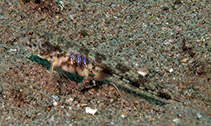| Family: |
Gobiidae (Gobies), subfamily: Gobiinae |
| Max. size: |
3.06 cm SL (male/unsexed); 2.41 cm SL (female) |
| Environment: |
demersal; marine; depth range 11 - 15 m |
| Distribution: |
Western Central Pacific: Papua New Guinea (Ref. 116711) and the Philippines (Ref. 127519). |
| Diagnosis: |
Dorsal spines (total): 7-7; Dorsal soft rays (total): 11-11; Anal spines: 1-1; Anal soft rays: 11-11. This species is distinguished by the following characters: D VI-I,11; A I,11; pectoral-fin rays 17; scales in longitudinal series 52-54; no scales on head, pectoral-fin base, and prepelvic region; body with cycloid scales anteriorly, becoming ctenoid posteriorly; no preopercular sensory canal and pores; gill opening extending forward to a vertical at posterior edge of preopercle; the first four dorsal-fin spines with short, filamentous tips; lanceolate caudal fin, longer than head, 2.3-2.7 in SL; distinct sexual dichromatism, male characterized by 5 brown saddles on back, 7 orange-brown bars on ventral half of body from level of dorsal-fin origin to base of last anal ray, prominent black bar present across outer two thirds of last two anal-fin rays, pale yellow pelvic fins with bright yellow spots; male and female with mid-lateral row of alternating large and small rectangular blotches within pair of thin stripes from the pectoral fin to caudal-fin base; females generally with darker brown markings on body and more ornate fins, consisting of variable dark stripes or blotches on dorsal, anal, and pelvic fins (Ref. 116711). |
| Biology: |
This species occurs in moderately sloped areas (about 20 degrees) with mixed substratum (mud, sand, and gravel). Of the five individuals observed, three are solitary and a mixed sex pair (male holotype and female paratype) shared the same burrow. It is associated with an unidentified alpheid shrimp (Ref. 116711). |
| IUCN Red List Status: |
Data deficient (DD); Date assessed: 14 November 2023 Ref. (130435)
|
| Threat to humans: |
harmless |
Source and more info: www.fishbase.org. For personal, classroom, and other internal use only. Not for publication.
